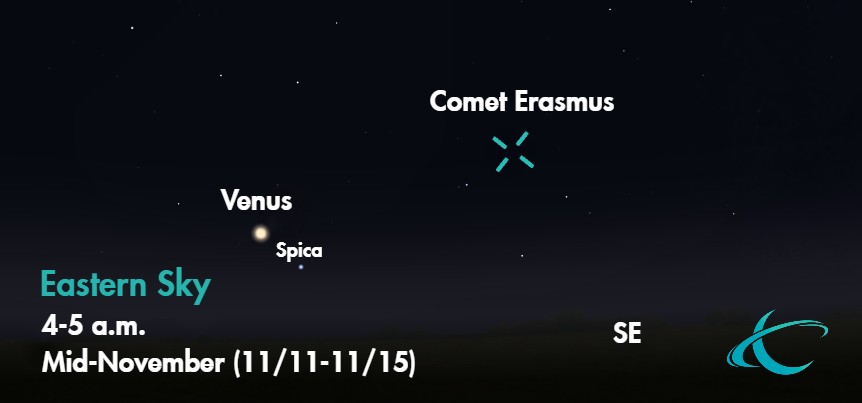How to Spot the Final Comet of 2020

Photo: Dan Bartlett, YouTube
Got a pair of binoculars and feel like hunting for a comet? You may be in luck. Comet Erasmus (C/2020 S3) is now sneaking through the early morning sky, in the hour or so before dawn.
When can you spot the comet?
In mid-November, the comet rises on the eastern horizon close to 4 a.m., and by 5 a.m. will hang low in the southeast, giving you a chance to spot it. It won’t be very high above the horizon, and will soon slip away into the light of dawn, but you have a chance!
Dusk will begin to grow around 6 a.m. Even as the comet climbs higher in the sky, it will be lost in the glow. Later in the month, comet Erasmus will sink gradually into the twilight as it nears its closest approach to the Sun, on December 12. You won’t see the comet then since it will be on the far side of the Sun and lost in its glare.

Where should you look?
To find the comet you can use the bright beacon of the planet Venus as a starting point. Venus will be hugging the horizon in the east, so make sure your eastern view is free of obstructions, like buildings, trees, or hills. You won’t mistake the brilliant and steady white flare of Venus, which will be close to the bright blue-white star, Spica.
Once you spot these markers, scan the sky to the right with your binoculars. If the sky is clear and relatively dark, you may find comet Erasmus as a fuzzy smudge against the background sky.
About the comet Erasmus
The comet was discovered on September 17 by Nicolas Erasmus at the South African Astronomical Observatory. Probably originating in the distant “halo” of dust, ice, and cometary bodies that surround our solar system, called the Oort Cloud, Erasmus orbits the Sun once every 3,037 years–so witnessing its passage is literally a once in a lifetime opportunity!
By the way, if you make that effort to get up very early on a cold November morning and don’t find the comet, you might say the whole thing was a disaster. And you’d be right. The word “disaster” comes from Latin, meaning “evil star”–what comets were originally called, when people thought of them as bad omens.




